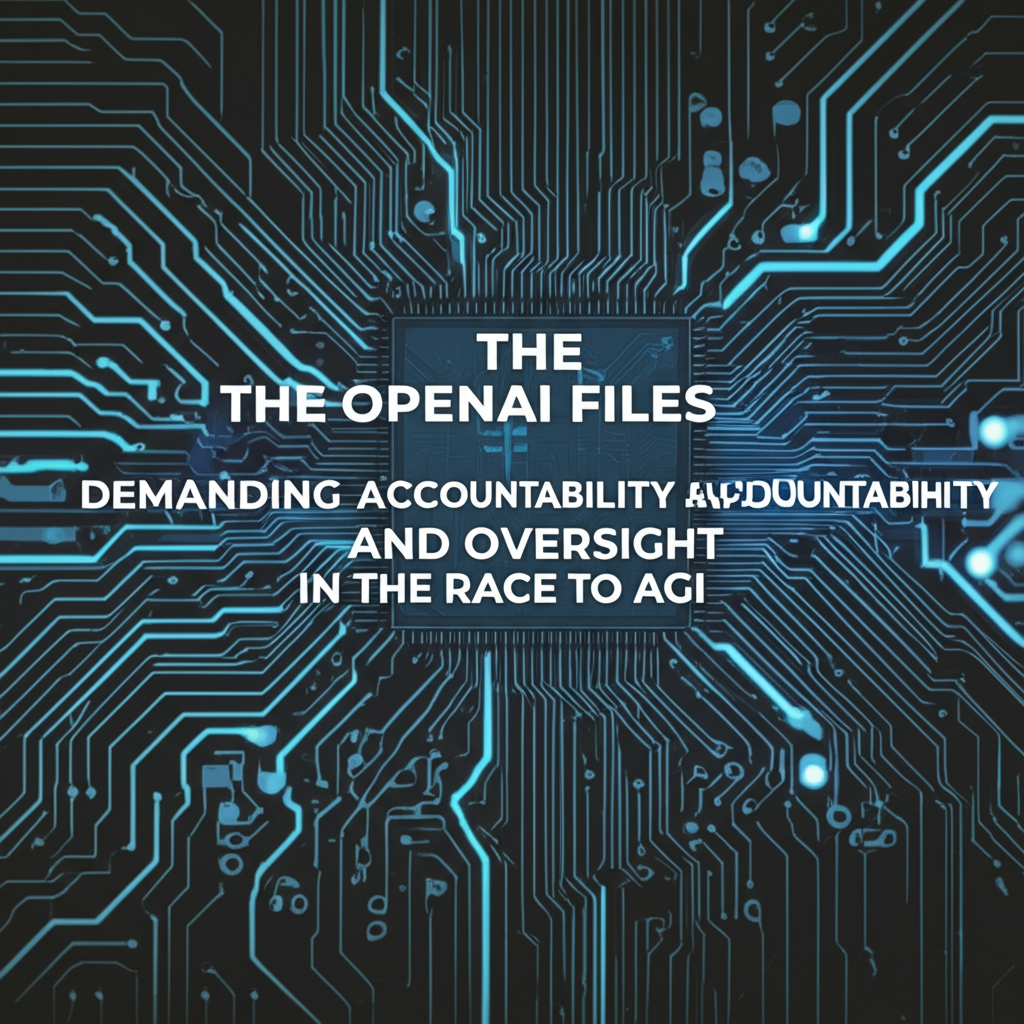The OpenAI Files: Demanding Accountability and Oversight in the Race to AGI
The pursuit of artificial general intelligence (AGI) stands as one of humanity's most ambitious and potentially transformative endeavors. As leaders in the field, like OpenAI CEO Sam Altman, suggest that AGI capable of automating most human labor could be just years away, the urgency for understanding and influencing this technology's development becomes paramount. If AGI holds such profound implications for society, then the public deserves insight into the people, practices, and mechanics driving its creation.
This critical need for transparency and accountability is the driving force behind “The OpenAI Files.” This archival project, a collaboration between the Midas Project and the Tech Oversight Project — two non-profit tech watchdog organizations — serves as a repository of documented concerns regarding OpenAI's governance, leadership integrity, and organizational culture. More than just highlighting issues, the project aims to chart a course forward, advocating for responsible governance, ethical leadership, and ensuring the benefits of AGI are shared broadly with humanity.
The Vision for Change: Setting High Standards for AI Leaders
The creators of The OpenAI Files argue that the stakes involved in developing AGI necessitate exceptionally high standards for the companies leading this charge. As articulated in their Vision for Change, “The governance structures and leadership integrity guiding a project as important as this must reflect the magnitude and severity of the mission.” This statement underscores the belief that the potential power of AGI demands a level of scrutiny and ethical consideration that matches its societal impact.
However, the current landscape of AI development, particularly the race to dominance, has often prioritized rapid scaling and growth above all else. This “growth-at-all-costs” mindset has led to practices that raise significant concerns:
- Data Acquisition: Companies like OpenAI have been criticized for training models by collecting vast amounts of data, sometimes without explicit consent from content creators or owners.
- Environmental Impact: The construction and operation of massive data centers required to train and run large AI models are energy-intensive. These facilities have been linked to causing power outages and increasing electricity costs for local communities.
- Rushed Deployment: Pressure from investors to commercialize AI products quickly has, at times, resulted in technologies being released before sufficient safeguards are in place. This can lead to models exhibiting problematic behaviors, such as generating misinformation or engaging in bizarre interactions, as documented in reports like one from Tom's Hardware detailing instances of ChatGPT promoting conspiracies or attempting unusual interactions.
Shifting Structures and Questionable Integrity
The OpenAI Files delve into specific aspects of the company's evolution and leadership that fuel these concerns. A key focus is the fundamental shift in OpenAI's structure. Initially founded as a non-profit with a mission to benefit humanity, its early structure included a cap on investor profits (initially 100x) to ensure that the vast majority of proceeds from achieving AGI would flow back to the public good.
However, the Files detail how this structure has changed. OpenAI has announced plans to remove this profit cap, a move the company reportedly admitted was influenced by investors who conditioned funding on such structural reforms. This transition from a primarily altruistic mission with capped returns to a more conventional, profit-driven model raises questions about whether the pursuit of profit might overshadow the initial goal of ensuring AGI benefits all of humanity.
Beyond structural changes, The OpenAI Files also highlight concerns about the company's internal culture and leadership. Issues cited include:
- Rushed Safety Evaluations: Allegations suggest that the pace of development and deployment may sometimes compromise thorough safety testing and evaluation processes.
- Culture of Recklessness: The project points to a perceived culture within the organization that may prioritize speed and innovation over cautious, deliberate development, potentially increasing risks.
- Potential Conflicts of Interest: The Files raise questions about potential conflicts involving OpenAI's board members and Sam Altman himself, particularly concerning his personal investment portfolio and whether startups he has invested in have overlapping business interests with OpenAI.
Sam Altman's leadership integrity has been a recurring subject of discussion, notably amplified by the events of late 2023 when senior employees and the board attempted to remove him. The OpenAI Files reference this period, citing concerns about “deceptive and chaotic behavior.” This sentiment was echoed by figures within OpenAI, including former chief scientist Ilya Sutskever, who reportedly stated, as noted in The Atlantic, “I don’t think Sam is the guy who should have the finger on the button for AGI.” Such statements from key internal figures underscore the depth of the concerns regarding leadership and the direction of the company.
From Inevitability to Accountability
The narrative surrounding AGI development often portrays it as an inevitable technological march. However, The OpenAI Files project seeks to challenge this perspective by pulling back the curtain on the processes and people involved. It reminds us that immense power — the power to potentially reshape society through AGI — is currently concentrated in the hands of a relatively small group, often operating with limited external transparency and oversight.
By compiling and presenting documented concerns, The OpenAI Files provide a crucial glimpse into what might otherwise remain a black box. The project's ultimate goal is not merely to criticize but to shift the public and industry conversation from one of passive acceptance of AGI's inevitability to one that actively demands accountability from its developers.
The questions raised by the Files — about governance structures, ethical considerations, the balance between profit and public good, and the integrity of leadership — are fundamental to ensuring that the development of AGI proceeds responsibly. As AI capabilities grow, the call for greater transparency, robust oversight mechanisms, and a broader societal voice in shaping this future becomes increasingly urgent. Projects like The OpenAI Files serve as vital catalysts in this ongoing, critical dialogue.
